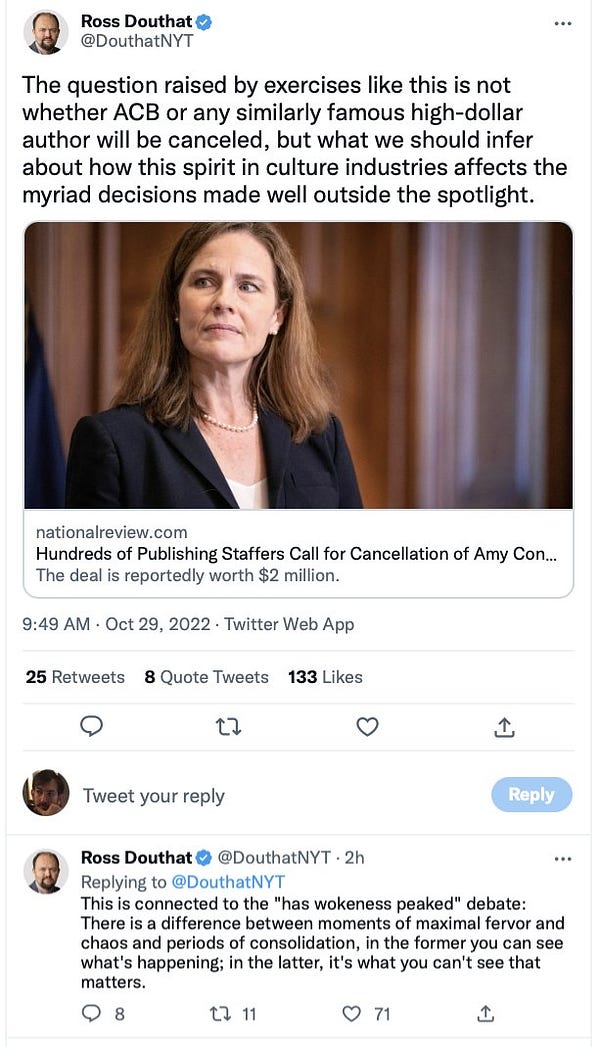E-Pluribus | November 2, 2022
James Bennet was not the only editor railroaded; the shortcomings of longtermism; and equity - some people keep using that word - it doesn't mean what they think it means.
A round-up of the latest and best writing and musings on the rise of illiberalism in the public discourse:
Isaac Schorr: The Other Editor Who Got Canceled
The Washington Post’s Erik Wemple made a splash with his recent mea culpa on the New York Times’ firing of James Bennet in 2020. At National Review, Isaac Schorr reminds us that Bennet was not the only big media editor to fall victim to a purge, recounting the experience of David Mastio of USA Today.
Amid all the news about — and relitigation of — the New York Times’ firing of former editorial-page editor James Bennet after he published an op-ed by Senator Tom Cotton, it’s worth remembering the other James Bennet: David Mastio, USA Today’s former deputy editorial-page editor, whose story I’ve already told.
In August 2021, Mastio tweeted that “people who are pregnant are also women.” Shortly thereafter, opinion editor Kristen DelGuzzi and editor in chief Nicole Carroll sent Mastio a memo informing him that as a result of his tweet, in addition to previous “lapses in judgment,” he would be demoted to “opinion writer,” with a pay cut of $30,000 a year.
Read the whole thing.
Matt Johnson: The Problems with Longtermism
A couple of weeks ago we included in our daily roundup Oliver Traldi’s review of William MacAskill’s new book, What We Owe the Future. More recently, Matt Johnson reviewed the book as well, and at Quillette highlights some of the areas in which “longtermism” may be less than practical despite its obvious theoretical benefits.
[William] MacAskill’s new book is a manifesto for “longtermism,” which he has described as the “idea that positively influencing the long-term future is a key moral priority of our time.” This may sound like a truism, but it’s surprisingly controversial—as many deceptively simple moral principles are—and MacAskill presents his case in an accessible and convincing way. Many of the most important ethical arguments are those that are half-settled in people’s minds but haven’t yet been fully articulated.
Many critics of longtermism acknowledge that it is ethically compelling, but they claim that concern about the distant future is probably too abstract to be socially and politically actionable. For example, Robert Wright recently argued that more effective shorttermism would address many of the problems MacAskill is concerned about: “If people were skilled shorttermists—if they pursued short-term interests wisely—our long-term problems, including the existential ones, would be manageable.” Wright points out that the threat of nuclear weapons, engineered pathogens, climate change, and so on are immediate short-term problems that have significant long-term consequences. Yet we refuse to address many of these issues, despite the fact that they could have devastating consequences for us and our children. This only makes it less likely that people can be mobilized to care about issues that affect strangers who will be born thousands of years from now.
[ . . . ]
Still, it’s difficult to see how the effort to prevent value lock-in will work in practice. How does MacAskill suggest that the programmers of AGI (and those who build the institutions that govern its rise) promote value ecumenicalism without descending into relativism? What happens when competing values clash? At some point, decisions have to be made about the right course of action, and a plurality of (often contradictory) values won’t make these decisions any easier. It’s one thing to argue that we shouldn’t arrogantly presume that we have all the right answers to fundamental moral questions, but it’s possible to take this modesty too far. While value ecumenicalism sounds appropriately scrupulous and inclusive for an uncertain future, it seems vulnerable to paralysis and inaction. The insistence that our values are bound to evolve shouldn’t become a dismissal of humanity’s hard-won philosophical and political achievements. This is why MacAskill’s suggestion about charter cities is disconcerting—it demonstrates that he’s agnostic about which economic and political systems we should adopt, despite centuries of evidence in support of several systems we already have.
Read it all here.
William McGurn: Affirmative Action Exposes the Secret Meaning of Equity
The Supreme Court’s consideration of affirmative action this term has many commentators weighing in on various aspects and implication of the policy and its possible termination. At The Wall Street Journal, William McGurn looks at one of the more insidious aspects of affirmative action: corruption of the concept of equity.
[U]se [of the word equity] is almost always disingenuous because its champions are betting that when the public hears the word “equity,” they’ll hear it in the dictionary sense as fair and equal treatment for all. But within the progressive world, everyone understands it as a way to push some races to the head of the line while shoving others back—primarily higher-achieving Asian-Americans, in the case of college admissions.
Vice President Kamala Harris let this particular cat out of the bag recently when she invoked “equity” for how the administration will allocate resources to deal with extreme weather conditions. When pressed on what exactly she meant, the White House was vague, and the Federal Emergency Management Agency quickly tried to clean up her mess by saying that all in need would be helped.
Which points to another defining feature of equity. Its advocates hate having to define in public what it really means. That is also true of Harvard and North Carolina, which are manifestly uncomfortable spelling out just how equity operates in their admissions decisions.
Moreover, Americans are typically assured equity’s use will be limited and temporary. Grutter is typical in that sense. In oral argument Justice Amy Coney Barrett brought up Justice Sandra Day O’Connor’s majority opinion in Grutter, which declared the use of race in admissions must be limited in time.
Read it all.
Around Twitter
Nicholas Grossman’s contention that cancel culture is overblown gets some pushback from Damon Linker:



Free speech, Twitter, "misinformation”, and misinformation about misinformation":



And finally, one more: attorney Chris Marchese sets Senator Dick Durbin straight on free speech and misinformation:












